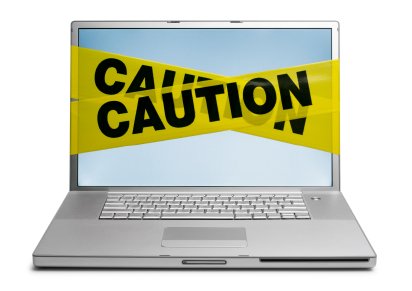Things we don't learn in schools- How to use the internet safely

Most of us have computers and many of us use the internet on a daily basis. The internet has taken over the work of many books to give us information and it is very easy to search for answers on our mobile devices, tablets, and computers. In fact, it is so easy to be connected anywhere and everywhere.
Technology has changed our worlds tremendously and it has become such a part of our lives that we struggle to live without it. We get frustrated if the electricity goes off and we cannot access our devices. Some people are totally dependent on the internet to do their jobs and far more people have started to work from home, which makes their work hours fit in better with their every day lives.
You will be surprised just how helpful the internet can be and if you use the internet to your advantage then you can be most productive.
BUT the internet can also be a very scary place and can rob you from everything you own.
A 19-year-old running for public office in New Hampshire found out about the importance of following Internet safety rules the hard way. As Seacoast Online reports, his opponents found images in his social media posts that were sexually suggestive and referenced past drug use.
Just like that, his political career crashed and burned upon take-off. But, unfortunately, he isn't the only one, as careless Internet habits have left others exposed to scams, identity theft and physical harm at the hands of people they met online. With more users accessing the Internet through mobile devices, these risks are changing and growing by the minute.
Hackers are ALWAYS on the lookout for personal information or access to your credit card and bank information. Unsafe surfing can lead to other threats like - Cyber bullying, embarrassing personal comments or images, and once something is online it can spread like a wildfire.
Here are the Top 10 Internet safety rules to follow to help you avoid getting into trouble online!
1. Personal information must be kept limited and professional.
2. Be wary where you enter your home address or relationship status. Keep exposure to yourself limited. You wouldn’t give your personal information to a stranger walking past you, so why do you want to hand it to millions of people online?
3. Do not switch off your privacy settings
Marketers love to know everything about you. Hackers also want to know everything about you. Make sure that your computer settings are set to privacy. Major websites like Facebook also have privacy-enhancing settings available. These settings are sometimes (deliberately) hard to find because companies want your personal information for its marketing value. Make sure you have enabled these privacy safeguards and keep them enabled.
4. Practice safe browsing!
You wouldn’t choose to walk around in a dangerous area filled with crime so why do you want to surf around in dangerous places online?
Cyber-criminals often use very interesting content to lure people in. People are tempted by interesting content and may let their guard down while searching for it. One careless click can get you into deep trouble.
If you expose personal data on a website or click on the wrong website, your computer can be infected with a virus. Possibly even malware and it is difficult to remove. It can also cause you to lose very valuable information from your computer so please be sure that the website is safe BEFORE you enter it!
5. Make Sure Your Internet Connection is Secure
Connect to a secure WiFi network, make sure your privacy settings are in place instead of using OPEN WiFi. Your computer could easily be infected with a virus. NEVER enter your personal details or bank account number if you don’t have a secure connection.
6. Be Careful What You Download!
A top goal of cyber-criminals is to trick you into downloading malware—programs or apps that carry malware or try to steal information. This malware can be disguised as an app: anything from a popular game to something that checks traffic or the weather. DON’T download apps that look suspicious or come from a site you don’t fully trust.
7. Choose Strong Passwords
Passwords are one of the biggest weak spots in the whole internet industry. People tend to use easy passwords so that they can remember it easily. These passwords are extremely easy for cyber thieves to guess. There are plenty of secure password manager software available online that you can use successfully to store all your passwords. Google also has a secure password protector where you have to log in to expose your passwords.
Use strong passwords that are difficult and contains at least a set of mixed numbers, symbols as well as letters. Make your passwords as long as possible to make it as difficult as possible for thieves to guess. It is also important NOT to use the same password for all your sites.
It is also extremely important NOT to click on any links via email that asks you to fill in any bank details.
8. Only use secure sites for purchases online
Every time you make a purchase online, you need to provide credit card or bank account information. Only supply this information to sites that provide secure, encrypted connections. You can identify secure sites by looking for an address that starts with https: The S is for secure rather than simply http: Those sites are NOT secure.
9. Be Careful What You Post!
Once you put something online, it has probably been shared already. Even if you try and remove it, the photo or comment might still be traced back to you. You don’t want to end your career, before you even start it.
It is a known fact that social media sites make backups of their servers and they do not remove any copies that were made by anyone else. Bad things have a way of showing up on very unexpected times so THINK before you post anything online. You don’t want to post anything online that you don’t want to be made public.
Once it is posted chances are that you will not be able to delete it again. Think twice before posting a selfie you took at a party and don’t comment if you can be embarrassed by it in future.
DON’T PUT ANYTHING ONLINE THAT YOU DON’T WANT YOUR OWN PARENTS, FRIENDS OR POSSIBLE PROSPECTIVE EMPLOYERS TO SEE.
10. Be Careful Who You Meet Online!
People that you meet online, are NOT always who they claim to be. Many of these people might not even be real. Have you ever tried to create a fake social media profile? It is the easiest thing in the world to do! Many hackers and predators create fake social media profiles and they post things that lure you in.
Be as cautious as you would be in real life. Just because something shows online and it seems legit, doesn’t that it is trustworthy.
11. Keep Your Antivirus Program Up to Date!
With windows 10 there is already a built-in antivirus that protects your computer from most attacks. If you have an extra antivirus program you need to keep this up to date! Internet security software cannot protect against every threat, but it will detect and remove most malware. Do those annoying updates as they often obtain vital security updates which will prevent your computer from being infected with malware and it can protect you from cyber- attacks. A cyber-attack is actually a real thing and you can lose valuable information if you are not cautious.
Watch this video for more information on browsing safely!



What a sad world the youth are growing into.
I am glad when growing up things were on paper, and that was easy to burn and destroy.
Your warnings are well worth repeating, thank you
A really helpful and interesting article about internet safety. Thanks @giantbear for sharing this. Many people take for granted the importance of playing safe when online. Similar to the experience you shared, I have a friend that lost a big job opportunity just because of the kind of things he posts on his Facebook page. Its an ugly experience, but if everyone can learn to safety conscious when using the internet, such things wont happen. Resteemed.
I have been meaning to tell you how interesting I find your posts! I try and resteem and vote your posts with the steemiteducation account as far as possible. Thank you for your effort to help us out!
Thanks. I will keep on trying my best to support the community. Together, everyone wins.
My worst nightmare but I followed all the tips
Hi @giantbear!
Your post was upvoted by @steem-ua, new Steem dApp, using UserAuthority for algorithmic post curation!
Your UA account score is currently 5.210 which ranks you at #909 across all Steem accounts.
Your rank has dropped 6 places in the last three days (old rank 903).
In our last Algorithmic Curation Round, consisting of 192 contributions, your post is ranked at #99.
Evaluation of your UA score:
Feel free to join our @steem-ua Discord server
You got a 21.11% upvote from @ocdb courtesy of @giantbear! :)
@ocdb is a non-profit bidbot for whitelisted Steemians, current max bid is 40 SBD and the equivalent amount in STEEM.
Check our website https://thegoodwhales.io/ for the whitelist, queue and delegation info. Join our Discord channel for more information.
If you like what @ocd does, consider voting for ocd-witness through SteemConnect or on the Steemit Witnesses page. :)